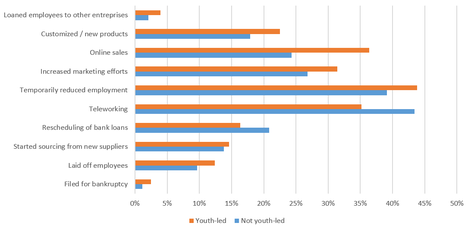
Blog: Tailored assistance for agile young entrepreneurs in times of crisis
One in four young people around the world are entrepreneurs or self-employed¹. Aged between 18 and 34 years of age, they are agents of change in their society, creating jobs and solving social problems through the enterprises they create.
The COVID-19 crisis has hit young entrepreneurs hard, according to ITC's COVID-19 Business Impact Survey². In April and May 2020, the International Trade Centre surveyed over 2,000 business leaders and managers in 130 countries, including beneficiaries of ITC's Youth and Trade Programme. One-fifth of the respondents were under the age of 35. Comparing their survey responses to those of their elders yields interesting insights into how young entrepreneurs are weathering the pandemic storm.
Young entrepreneurs more likely to expect bankruptcy because of COVID-19
Youth-led firms are exposed to the impact of the pandemic to roughly the same degree as firms led by the older generation. That is, a similar proportion of young entrepreneurs said that COVID-19 strongly affected them like the rest of the population.
However, young entrepreneurs are significantly more likely to see bankruptcy on the horizon. Forty-two percent of companies led by managers or owners under 35 years of age said that there was a risk that their business will permanently shut down because of the crisis, compared to just 35% for non-youth-led firms.
This significant seven-point gap shows that youth-led companies are more threatened by COVID-induced bankruptcy than other companies are. It suggests that even though youth-led firms are not necessarily more exposed to the economic impacts of the pandemic, they are more sensitive to the impacts and less able to cope. Even after taking into account that they are smaller, with fewer employees, youth-led firms find it harder to adapt to this turmoil. Possible reasons include their lack of diversification, social networks and professional experience.
On the other hand, the survey finds that youth-led firms were significantly more likely to adopt an agile response to the situation than their older counterparts would, as they are more likely to turn to online sales, create new or customized products, or loan their employees to other enterprises in response to the crisis.
Percentage of youth and non-youth firms adopting specific strategies in response to COVID-19
Note: Business respondents were asked 'Have you adopted any of the following strategies to cope with the crisis?' and 'What is the age of the top manager of the business?' The respondent was categorized as a 'youth-led firm' if s/he answered '34 years and younger' to the latter question, and 'not youth-led firm' if s/he answered '35 years of age and older'. Data from 2,123 businesses in 128 countries. Response rates vary across countries and regions.
Source: ITC calculations based on ITC COVID-19 Business Impact Survey. Data collected from 21 April to 10 May 2020.
Some coping strategies that were popular among seasoned business leaders appeared less appealing to young people. Youth entrepreneurs were less likely to telework or reschedule bank loans. To some extent, this is because young entrepreneurs tend to have smaller businesses, which have a lower propensity to telework, and were less likely to have a loan before the crisis in the first place³. But the tendency of young entrepreneurs to try new proactive things, rather than adjust to current practices, is witness to a different, more creative approach to surmounting difficulties.
Young entrepreneurs find it easy to access information …
The data suggest that young entrepreneurs have a subtly different relationship with government support measures during the COVID-19 crisis. Young entrepreneurs found it easier, on average, to access information and benefits from COVID-related government assistance programmes compared to their more aged peers. This may reflect relatively high digital literacy rates among young entrepreneurs. Familiarity and adeptness with online business support information and procedures came in handy in the days and weeks after the virus started to spread.
… and ask for different types of assistance than their elder peers
However, only a minority of surveyed youth-led firms said they had received help from business support organizations. When asked about what the government could do to help, young entrepreneurs seemed to need concrete support in the short term to reduce costs. They were significantly more likely to say that rent subsidies would be most helpful to them, for example. Employment programmes and support to self-employed people were also popular. Conversely, young entrepreneurs were less interested in tax waivers and financial programmes compared to older entrepreneurs.
Rapid targeted assistance needed
Emergency government programmes around the world are set to stave off bankruptcy for at-risk firms - and the evidence from this survey suggests that those could be particularly effective for youth-led companies. They are more at risk of going bankrupt and thirstier for short-term help to reduce costs.
As young entrepreneurs reconfigure their enterprises rapidly to stay profitable during the pandemic disruption, targeted measures have high chances of success. ITC's Youth and Trade Programme contributes to efforts in this direction through the Coping with COVID-19 Webinar series hosted by the Ye! Community, and through a video messaging campaign launched in partnership with the Youth Alliance for Leadership and Development in Africa (YALDA).
¹ Global Entrepreneurship Monitor (GEM) 2015 APS Global Individual Level Survey Data.
² ITC will publish further results and updates including data from partnering local and international business support institutions. Partners include: Conférence permanente des chambres consulaires africaines et francophones (CPCCAF), Chamber of Commerce and Industry of Benin, Ministry of Industry and Handicraft, Chamber of Commerce and Industry of Togo, Department of Trade and Industry Philippines, Kenya National Chamber of Commerce and Industry (KNCCI).
³ Sarah Mohan and Valentina Rollo. 2019. "Empowering youth for sustainable trade". Chapter 8 in the OECD-WTO Aid for Trade at Glance Report 2019. http://www.intracen.org/publication/Aid-for-Trade-at-a-Glance-2019-Empowering-youth-for-sustainable-trade-en/




